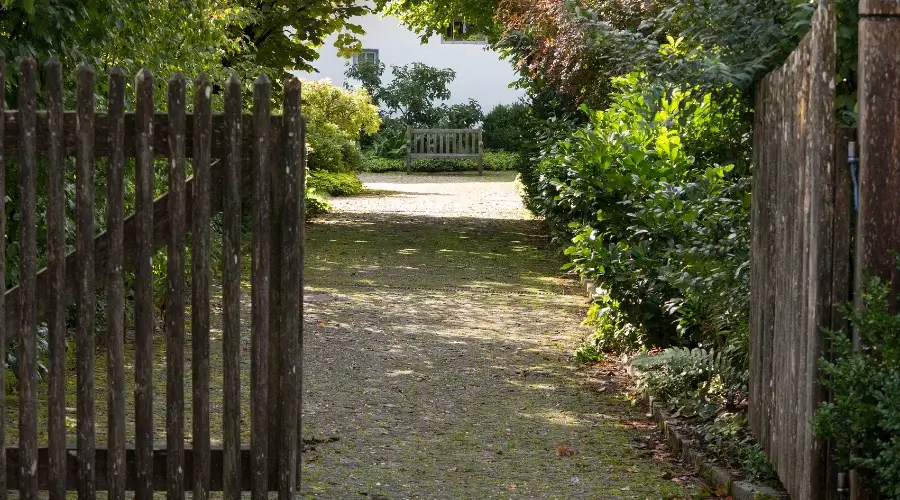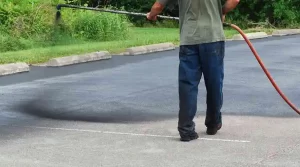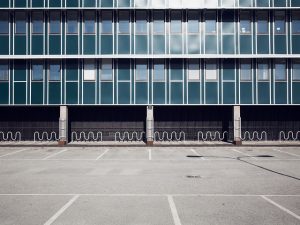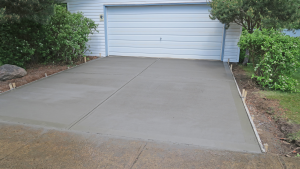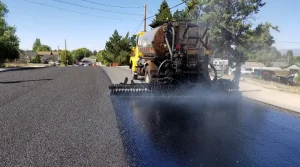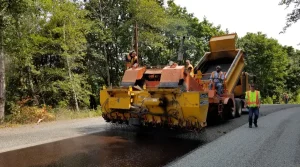When it comes to enhancing the overall look and resale value of your home, your driveway holds a crucial role. Whether you’re embarking on a new construction project or revamping your landscaping and hardscape, it’s essential to explore the latest driveway designs and materials.
Recent years have witnessed a shift in driveway trends, driven by evolving preferences, drawbacks in older options, and the introduction of innovative materials.
Today, homeowners are making driveway design choices that consider factors like cost, upkeep, aesthetics, and sustainability. For instance, modern permeable pavers have eclipsed traditional materials, prioritizing eco-friendliness by facilitating rainwater absorption into the soil, thereby preventing runoff and erosion. However, this is just one of the unexpected trend reversals in driveways.
Please keep reading to uncover more fading trends and learn about fresh approaches to creating the perfect driveway for your property as our experts guide you through this transformation. To discover Quality, Affordability, and Durability, contact Jersey City Paving and Concrete right away.
Straight Line Driveways
In landscaping and hardscaping, using straight lines needs to be improved in elevating your home’s curb appeal. Raf Michalowski, the designer and CEO of Meble Furniture, shares with House Digest, “Outdated driveway designs often feature an abundance of straight lines, like long stretches of square concrete blocks. These straight lines lack aesthetic appeal and can lend a cold and unwelcoming feel to a home.
In place of straight lines, contemporary design trends draw inspiration from nature. “As people’s preferences evolve, they are gravitating towards more natural styles that incorporate flowing curves and gentler lines,” he remarks. The prevailing sentiment favors designs that break free from the rigidity of orderly lines. “I recommend exploring driveways with meandering patterns or organic shapes as a promising alternative. These designs can utilize various materials, including brick, gravel, or pavers. They introduce a more organic ambiance to the space, making it inviting and cozy,” Michalowski elucidates. An appealing driveway layout may embrace curved, U-shaped, circular, or Y-shaped configurations, all of which steer clear of the stark appearance of a straight expanse of pavement extending from the street to your home.
Brick Driveways
If you’re willing to dedicate your time, effort, and finances to driveway maintenance, brick could be a suitable material choice. However, for most homeowners seeking a more cost-effective and less demanding solution, the popularity of brick or brick-like driveways has waned. Martin Orefice, CEO of Rent To Own Labs, explains, “Driveways crafted from bricks or paving stones, or those stamped to mimic them, are no longer as favored as they once were. To begin with, the process of paving a driveway with individual bricks is expensive, involving significantly more labor and higher material costs compared to concrete or asphalt.”
Furthermore, driveways of this kind tend to demand frequent upkeep, as the bricks are prone to shifting and cracking during freeze/thaw cycles. If you opt for a brick driveway, remember that the initial installation cost is just the beginning of your commitment. You must invest in cleaning, sealing, re-grouting, and replacing bricks. Additionally, the susceptibility of bricks to cracking under the weight of vehicles repeatedly driving and parking on them may make them an impractical choice for driveways.
Natural Stone Driveways
While natural stone driveways undoubtedly enhance your home’s curb appeal, they come with distinct disadvantages. Keith Sant, founder and CEO of Kind House Buyers, observes, “Natural stone driveways have gained popularity in recent years, but this trend may be waning. While these driveways are visually appealing and require minimal maintenance, they can be costly to install and upkeep.”
In the current economic climate, the surge in construction material costs has prompted homeowners to seek areas to economize on new construction and home improvement projects. One such cost-saving strategy involves forgoing expensive paving materials, like natural stone. Sant recommends: “Given the continually rising material costs, many homeowners are turning to more budget-friendly driveway options. Asphalt and concrete driveways are rapidly becoming the preferred choice for many. They are relatively affordable to install, easy to maintain, and offer a range of colors and patterns to give your home a distinctive appearance.”
Colored Concrete Driveways
Homeowners constantly seek ways to enhance curb appeal and distinguish their homes from their neighbors. However, trendy driveway treatments tend to rise and fall in popularity. “Colored concrete driveways, once a fashionable choice, are now losing favor. While the vibrant, attention-grabbing colors may initially look appealing, they often succumb to fading due to exposure to the elements. This fading can lead to a dull and outdated appearance over time,” cautions Sant.
For those aiming to bestow a high-end appearance upon a concrete driveway, Sant suggests stamping instead of coloring. “Stamped concrete is a more durable and cost-effective alternative to colored concrete. It offers the same scope for customizable colors and patterns but exhibits greater resistance to fading and wear. This makes it an excellent choice for heavily trafficked driveways.”
When installing a stamped concrete driveway, you can select from various textures and patterns that emulate stone, slate, pavers, brick, wood planks, and more. While it may develop cracks over time due to freezing and thawing cycles, stamped concrete is straightforward to maintain. Merely remove loose debris through sweeping or blowing, and occasionally rinse with a garden hose to keep it looking its best.”
Gravel Driveways
If you currently have a gravel driveway, consider paving it. As per Sant’s advice, “Gravel driveways were once considered a cost-effective option for homeowners, but this trend is rapidly losing ground. While gravel driveways may offer relatively low installation costs, they are challenging in maintenance. Regular gravel replenishment and periodic leveling of the driveway’s surface become necessary.
Gravel driveways come with several additional drawbacks. They appear disorderly as the crushed stone fragments scatter onto the adjacent lawn. They become dusty in dry weather and can form muddy ruts during wet seasons. Walking on gravel driveways, particularly in high heels, can be uncomfortable, and your vehicle accumulates dirt from this type of surface.
Instead of a gravel driveway, Sant proposes the use of pavers. “Paver driveways present an excellent alternative for homeowners seeking an aesthetically pleasing and low-maintenance driveway. Pavers offer a diverse array of shapes, colors, and sizes, making them an ideal choice for crafting customized designs. Moreover, they surpass gravel driveways in durability and require less maintenance over time,” he emphasizes.
Large, Ornate Gated Driveways
Unless your residence rivals Buckingham Palace, it might be wise to forgo the extravagant gates positioned at the entrance of your driveway. Shaun Martin, the proprietor and CEO of We Buy Houses in Denver, notes, “The popularity of large, ornate gates is waning among homeowners who value simplicity and privacy. Instead of investing in grandiose gates, more homeowners favor smaller, more understated styles that harmonize with the natural surroundings or boast a sleek, modern aesthetic.”
In addition to these more modest designs, you can harness modern technology to ensure privacy and security. “Automated gates are emerging as the preferred choice for driveway design, offering convenience and enhanced security. Homeowners can effortlessly open and close their gates at the push of a button or even remotely from the comfort of their home, ensuring the ongoing safety of their property,” according to Martin.
An automated gate features a motor that facilitates its movement through either a sliding or swinging motion. Activation can occur via a keypad code or remotely via a smartphone app. With a sleek and contemporary appearance, these automated gates seamlessly complement today’s landscaping and architectural designs.
Minimalist Driveways
A plain, unadorned concrete driveway that lacks a connection to the surrounding landscape may earn minimalism points, but more is needed to enhance your home’s curb appeal. According to real estate investor and house flipper Ben Wagner, “Minimalist driveways are losing favor because they lack the captivating features or embellishments that set them apart. People desire driveways that mirror their style and character. Minimalist driveways offer little beyond serving as a functional path, so their popularity is declining.”
The driveways that are stepping in to replace the minimalist options are those that seamlessly integrate natural elements into their designs. Wagner elaborates, “A burgeoning trend in driveway design involves integrating green elements. Homeowners are increasingly exploring incorporating green spaces, such as grass strips or planter beds, directly within their driveways.”
To break free from the monotony of minimalism, you can opt for a curvy, Y-shaped, or circular driveway that surrounds planting beds adorned with trees, shrubs, and flowers. Additionally, the classic ribbon driveways from the past are making a comeback. These designs feature two concrete strips accommodating your car’s tires, with a ribbon of turf grass flourishing between them.
Unsustainable Driveways
Unsustainable driveways constructed with non-eco-friendly materials are falling out of favor. Ron Wysocarski, a real estate broker at Wyse Home Team Realty, points out, “A focus on eco-friendliness and a fresh visual appeal has driven the popularity of permeable driveways, especially among Gen Z and Millennial homeowners, who represent the largest share of the housing market.”
He adds, “Permeable driveways allow rainwater to permeate the surface and penetrate the ground, mitigating runoff and enhancing water management. These driveways can be fashioned using materials like permeable or grass pavers, offering a more natural and visually appealing aesthetic while delivering environmental benefits.”
Homeowners can employ Turfstone pavers to create driveways that facilitate water absorption into the ground and manage runoff, mitigating soil erosion. The Turfstone system establishes a lattice-like grid of concrete pavers with ample openings that enable grass to grow through the hardscape. Maintaining a Turfstone driveway involves mowing the grass much like a lawn, resulting in a lush, green appearance that seamlessly blends your driveway with the landscape while addressing the issue of muddy ruts in the soil.

